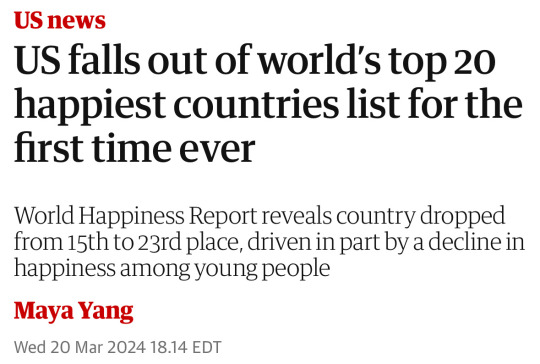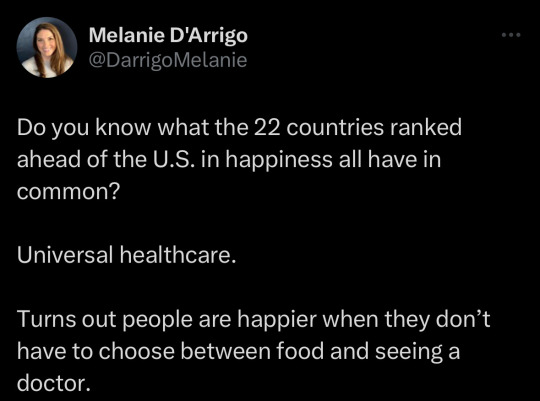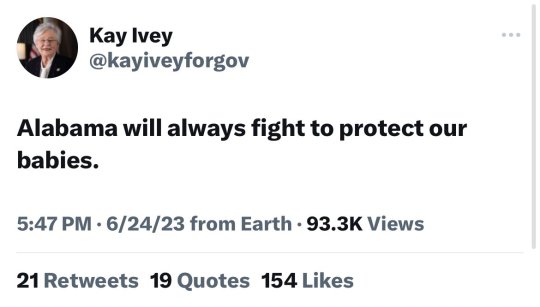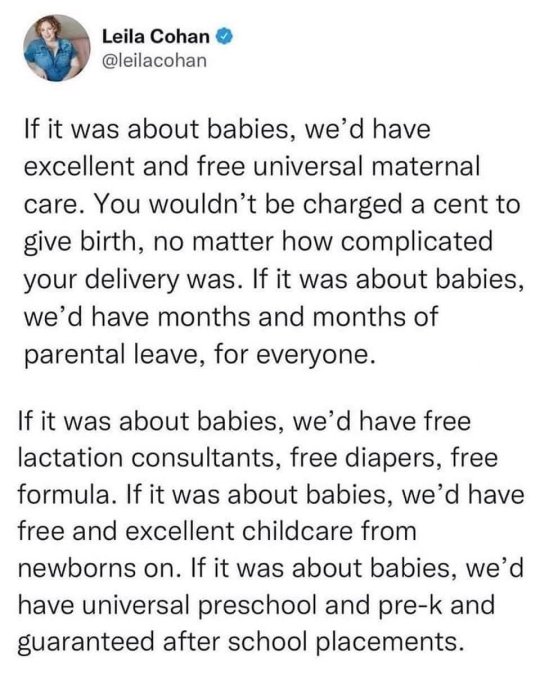#US Healthcare News
Text
Sharp rise in pregnancy-related illness in Mass. from 2011-2020 [Video]
#MAHealthcare#USHealthcareNews#HealthcareTechnology#MA Healthcare#US Healthcare News#Healthcare Technology
2 notes
·
View notes
Text

Source

Source
#politics#us politics#government#universal healthcare#Medicare for all#news#the left#progressive#current events#twitter post#happiness#international politics#social welfare
11K notes
·
View notes
Text
"The Biden Administration last week [early December, 2023] announced it would be seizing patents for drugs and drug manufacturing procedures developed using government money.
A draft of the new law, seen by Reuters, said that the government will consider various factors including whether a medical situation is leading to increased prices of the drug at any given time, or whether only a small section of Americans can afford it.
The new executive order is the first exercise in what is called “march-in-rights” which allows relevant government agencies to redistribute patents if they were generated under government funding. The NIH has long maintained march-in-rights, but previous directors have been unwilling to use them, fearing consequences.
“We’ll make it clear that when drug companies won’t sell taxpayer funded drugs at reasonable prices, we will be prepared to allow other companies to provide those drugs for less,” White House adviser Lael Brainard said on a press call.
But just how much taxpayer money is going toward funding drugs? A research paper from the Insitute for New Economic Thought showed that “NIH funding contributed to research associated with every new drug approved from 2010-2019, totaling $230 billion.”
The authors of the paper continue, writing “NIH funding also produced 22 thousand patents, which provided marketing exclusivity for 27 (8.6%) of the drugs approved [between] 2010-2019.”
How we do drug discovery and production in America has a number of fundamental flaws that have created problems in the health service industry.
It costs billions of dollars and sometimes as many as 5 to 10 years to bring a drug to market in the US, which means that only companies with massive financial muscle can do so with any regularity, and that smaller, more innovative companies can’t compete with these pharma giants.
This also means that if a company can’t recoup that loss, a single failed drug can result in massive disruptions to business. To protect themselves, pharmaceutical companies establish piles of patents on drugs and drug manufacturing procedures. Especially if the drug in question treats a rare or obscure disease, these patents essentially ensure the company has monoselective pricing regimes.
However, if a company can convince the NIH that a particular drug should be considered a public health priority, they can be almost entirely funded by the government, as the research paper showed.
Some market participants, in this case the famous billionaire investor Mark Cuban, have attempted to remedy the issue of drug costs in America by manufacturing generic versions of patented drugs sold for common diseases."
-via Good News Network, December 11, 2023
#united states#us politics#biden administration#executive order#prescription drugs#medical news#healthcare#healthcare access#biden#big pharma#drug prices#public health#nih#national institutes of health#good news#hope
10K notes
·
View notes
Text
Shooting in Hollywood, Florida: 9 injured near beach boardwalk [Video]
#FLHealthcare#USHealthcareNews#FLHealthcareNews#FLMedicine#HealthcareFL#FL Healthcare#US Healthcare News#FL Healthcare News#FL Medicine#Healthcare FL
1 note
·
View note
Text
@/kittiearie on tiktok wrote this caption on her video: "When the sundown sisters' feminism is being upset Margot Robbie wasn't nominated for an Oscar but silent on how women and girls in Palestine don't have access to pads, tampons, contraceptive pills and other hygeine products while mothers are having their children without anesthetics."
some of white western feminist advocacy boils down to viewing issues (problematically so) as one-dimensional. their praxis never includes reflexivity, accountability, and intersectionality; while they ensure that their OWN reproductive health rights are never threatened, they vastly ignore so many people suffering in the world just because it doesn't directly impact them -looking at their priorities is just always so shameless and despicable.
#feminist#feminism#social justice#free palestine#free gaza#current events#current news#us imperialism#western imperialism#white feminism#intersectional social justice#intersectional activism#intersectional feminism#intersectionality#palestinian liberation#we are not free until we all are#reproductive health#reproductive rights#healthcare#margot robbie
2K notes
·
View notes
Text
A big cost and concern for many seniors in the U.S. is the price of prescription drugs and other healthcare expenses—and this year, thanks to The Inflation Reduction Act, their costs may go down dramatically, especially for patients fighting cancer or heart disease.
I learned about the new benefits because my ‘Medicare birthday’ is coming up in a couple months when I turn 65. I was shocked that there were so many positive changes being made, which I never heard about on the news.
Thousands of Americans on Medicare have been paying more than $14,000 a year for blood cancer drugs, more than $10,000 a year for ovarian cancer drugs, and more than $9,000 a year for breast cancer drugs, for instance.
That all changed beginning in 2023, after the Biden administration capped out-of-pocket prescriptions at $3,500—no matter what drugs were needed. And this year, in 2024, the cap for all Medicare out-of-pocket prescriptions went down to a maximum of $2,000.
“The American people won, and Big Pharma lost,” said President Biden in September 2022, after the legislation passed. “It’s going to be a godsend to many families.”
Another crucial medical necessity, the shingles vaccine, which many seniors skip because of the cost, is now free. Shingles is a painful rash with blisters, that can be followed by chronic pain, and other complications, for which there is no cure
In 2022, more than 2 million seniors paid between $100 and $200 for that vaccine, but starting last year, Medicare prescription drug plans dropped the cost for shots down to zero.
Another victory for consumers over Big Pharma affects anyone of any age who struggles with diabetes. The cost of life-saving insulin was capped at $35 a month [for people on Medicare].
Medicare is also lowering the costs of the premium for Part B—which covers outpatient visits to your doctors. 15 million Americans will save an average of $800 per year on health insurance costs, according to the US Department of Health and Human Services.
Last year, for the first time in history, Medicare began using the leverage power of its large patient pool to negotiate fair prices for drugs. Medicare is no longer accepting whatever drug prices that pharmaceutical companies demand.
Negotiations began on ten of the most widely used and expensive drugs.
Among the ten drugs selected for Medicare drug price negotiation were Eliquis, used by 3.7 million Americans and Jardiance and Xarelto, each used by over a million people. The ten drugs account for the highest total spending in Medicare Part D prescription plans...
How are all these cost-savings being paid for?
The government is able to pay for these benefits by making sure the biggest corporations in America are paying their fair share of federal taxes.
In 2020, for instance, dozens of American companies on the Fortune 500 list who made $40 billion in profit paid zero in federal taxes.
Starting in 2023, U.S. corporations are required to pay a minimum corporate tax of 15 percent. The Inflation Reduction Act created the CAMT, which imposed the 15% minimum tax on the adjusted financial statement income of any corporation with average income that exceeds $1 billion.
For years, Americans have decried the rising costs of health care—but in the last three years, there are plenty of positive developments.
-via Good News Network, February 25, 2024
#united states#medicare#healthcare#healthcare access#big pharma#prescription drugs#health insurance#us politics#good news#hope#seniors#aging#healthy aging
2K notes
·
View notes
Text


#News#politics#democrats#republicans#scotus#universal healthcare#bernie sanders#us government#schools#free school meals#lunch#kentucky#reproductive rights#twitter#Alabama
3K notes
·
View notes
Text
HOW CHRISTIANITY SUPPORTS MULTIRACIAL, MULTICULTURAL DEMOCRACY
'The Bible doesn't mention abortion or gay marriage, but it goes on and on about forgiving debt, liberating the poor, and healing the sick' — This pastor perfectly explained how the values expressed in Christianity can support a multiracial, multicultural democracy instead of right-wing extremism (via jamestalarico on TikTok)
#christianity #religion #democracy
#us politics#news#nowthisimpact#Instagram#2024#James Talarico#texas#christianity#religon#multiracial#multicultural#democracy#videos#now this#the bible#abortion#gay marriage#debt forgiveness#us healthcare#us health system#for profit healthcare#health insurance#drug prices#feed the hungry#house the homeless
318 notes
·
View notes
Text
Oct 30 (Reuters) - Some employees at CVS Health Corp (CVS.N) and Walgreens Boots Alliance's (WBA.O) U.S. pharmacies launched a three-day walkout starting Monday to push the companies to improve working conditions and add more staff to their stores.
The walkout, which has been dubbed "Pharmageddon" on social media platforms such as Meta's Facebook where it was largely planned, started on Monday and led to the closing of some stores in New York City, two organizers told Reuters.
Shane Jerominski, a former Walgreens pharmacist and one of the organizers of the walkout, told Reuters that as many as 5,000 pharmacy workers would walk out across the three days, but said that the exact number of affected stores and participating staff was not clear due to the lack of a union.
#news#us news#uspol#us pol#cvs#walgreens#pharmacy strike#healthcare strike#pharmageddon#hot labor fall#hot strike fall
552 notes
·
View notes
Text
Why are ppl scared to call it what it is and say we’re still going thru covid on top of seasonal illness. Like. That’s pretty important right. I was watching the news and they were like oh yeah we have an unprecedented number of flu cases “as well as other sicknesses” without actually saying Covid. No announcement abt vaccinations or masking or anything. Also if I hear someone joking abt “war flashbacks” for mentioning covid I fucking hate u
#source: most of my family members are nurses and it was so bad for one of them they had to be put on a ventilator. in the hospital they#worked at. looking back I think I had a reason to feel a little offput by the shows of support early pandemic#with people tying blue ribbons around trees and lighting signs blue to support healthcare workers#I get that it was supposed to be moral support when we couldn’t do anything but follow health advisories#and it did matter to make them feel uplifted and do something than nothing. im not gonna deny that#but. you can still help now. u know that right. you still have a responsibility here#u can still mask up. u can still get vaxxed and call in sick to avoid infecting others#don’t leave it on healthcare workers to pick up the pieces just because they were doing it before. do u think they had a choice?#nobody likes picking up the slack for someone else and now that we have more tools to do smth couldn’t we just. do it????#im not a virologist but i also feel like continuing to let it get worse by letting more mutations develop#could continue to set us back since this virus is pretty good at fucking us up long term and finding new ways to do that#while there are ppl still researching covid which is STILL A RELATIVELY NEW VIRUS. and studying possible treatment and cures#yapping#vent
388 notes
·
View notes
Text
if you dont know, the supreme court just allowed Idaho to ban gender affirming care for trans youth !! please send love to any transgender youth you know, especially anyone in Idaho.
this is absolutely terrifying, as a trans youth myself living in a state absolutely filled with right wing individuals, i am scared for me and my fellow trans youth living in ANY state, but especially red states like mine.
i'll reblog this post with anything i can find on how to help stop this, and you should too. please boost this, this affects all trans people, but especially trans youth, who already lack so many rights just for being youth.
#-travis#lgbt#lgbtq#lgbt+#lgbtq+#lgbtqia#lgbtq community#queer#queer community#queer rights#lgbt rights#gay rights#transgender rights#lgbtq news#trans youth#trans#transgender#trans rights#transblr#transmasc#transfem#trasnneu#nonbinary#lgbt news#gender affirming care#trans healthcare#trans rights are human rights#hrt#supreme court#us politics
252 notes
·
View notes
Text
Adopt or foster some furry friends in need. | Great Day SA [Video]
#TexasHealthcare#UnitedStatesHealthcareNews#USAHealthcareNews#USHealthcareNews#Texas Healthcare#United States Healthcare News#USA Healthcare News#US Healthcare News
0 notes
Text
youtube
Watch the 2024 American Climate Leadership Awards for High School Students now: https://youtu.be/5C-bb9PoRLc
The recording is now available on ecoAmerica's YouTube channel for viewers to be inspired by student climate leaders! Join Aishah-Nyeta Brown & Jerome Foster II and be inspired by student climate leaders as we recognize the High School Student finalists. Watch now to find out which student received the $25,000 grand prize and top recognition!
#ACLA24#ACLA24HighSchoolStudents#youtube#youtube video#climate leaders#climate solutions#climate action#climate and environment#climate#climate change#climate and health#climate blog#climate justice#climate news#weather and climate#environmental news#environment#environmental awareness#environment and health#environmental#environmental issues#environmental education#environmental justice#environmental protection#environmental health#high school students#high school#youth#youth of america#school
13K notes
·
View notes
Text
A new landmark study has found that access to gender-affirming healthcare significantly reduces rates of depression, gender dysphoria, and suicidality among transgender people.
While it’s no secret that providing gender-affirming care to transgender individuals who ask for it can greatly benefit their well-being, an increase in transphobic rhetoric and bans on gender-affirming healthcare has prompted thorough medical studies into the impact of such care.
Now, brand new research conducted in Melbourne, Australia, has found that allowing transgender people to access the care they’re after can reduce suicidality by a stunning 55%.
As part of the first-ever randomized controlled trial (RCT) on gender-affirming care, researchers took 64 transgender and gender-diverse adults who had been looking to start testosterone therapy and randomly split them into a treatment group and a control group.
While the treatment group was allowed to begin hormone therapy that week, the control group waited three months for their treatment to begin.
Before the study began, both groups were evaluated on depression, gender dysphoria, and suicidality. Three months later, the two groups were evaluated again.
RCTs for medical care can often be hard to conduct due to practical and ethical concerns. However, researchers of this study found a way to hold an RCT for this study by incorporating a shorter follow-up period. Rather than giving the control group a placebo drug, or no treatment at all, they were simply given a longer wait time.
The results showed a notable decrease in gender dysphoria, depression, and – most significantly – suicidality.
The group that received gender-affirming care right away saw a 55% reduction in suicidality compared to a 5% drop within the control group.
Depression scores in the treatment group decreased by half, while gender dysphoria rates also significantly decreased.
Breaking down their findings, researchers Brendan J. Nolan MBBS, Sav Zwickl, PhD, and Peter Locke wrote: “There was a statistically significant decrease in gender dysphoria in individuals with immediate [access to gender-affirming care] compared with delayed initiation of testosterone therapy.”
“A clinically significant decrease in depression and a decrease in suicidality also occurred with immediate testosterone therapy.”
“The findings of this trial suggest that testosterone therapy significantly decreases gender dysphoria, depression, and suicidality in transgender and gender-diverse individuals desiring testosterone therapy.”

Of course, this isn’t the first time that research has shown significant drops in depression and suicide rates among transgender individuals who receive gender-affirming care.
A 2022 medical study showed that young transgender people who have access to puberty blockers are 73% less at risk of suicide and report improved well-being.
But, as anti-trans activists advocate for further bans on gender-affirming care, one of the key arguments is that the evidence in support of the care isn’t up to scratch with GRADE (Grades of Recommendation, Assessment, Development, and Evaluation) standards.
So research like this landmark RCT is so significant to the transgender community and its allies as the fight for their healthcare rights rumbles on.
#us politics#news#pinknews#2023#gender affirming care#gender affirming healthcare#transgender healthcare#transgender#trans rights#trans healthcare#suicidality#depression#gender dysphoria#Australia#randomized controlled trial#trust the science#Brendan J. Nolan#Sav Zwickl#Peter Locke#testosterone therapy#Grades of Recommendation Assessment Development and Evaluation#lgbtqia+#lgbtqia+ rights
451 notes
·
View notes
Text
Less than three months after U.S. Senator Tammy Baldwin and her colleagues launched an investigation into the four major American manufacturers of inhalers, three of the companies have relented, making commitments to cap costs for their inhalers at $35 for patients who now pay much more.
25 million Americans have asthma and 16 million Americans have chronic obstructive pulmonary disease (COPD), meaning over 40 million Americans rely on inhalers to breathe.
Inhalers have been available since the 1950s, and most of the drugs they use have been on the market for more than 25 years.
According to a statement from the Wisconsin Senator’s office, inhaler manufacturers sell the exact same products at a much lower costs in other countries. One of AstraZeneca’s inhalers, Breztri Aerosphere, costs $645 in the U.S.—but just $49 in the UK. Inhalers made by Boehringer Ingelheim, GlaxoSmithKline, and Teva have similar disparities.
Baldwin and her Democratic colleagues—New Mexico Sen. Ben Ray Luján, Massachusetts Sen. Ed Markey, and Vermont Sen. Bernie Sanders—pressured the companies to lower their prices by writing letters to GSK, Boehringer Ingelheim, Teva, and AstraZeneca requesting a variety of documents that show why such higher prices are charged in America compared to Europe.
As a ranking member of the Senate Committee on Health, Education, Labor, and Pensions, Baldwin recently announced that as a result of the letters they had secured commitments from three of the four to lower the out-of-pocket costs of inhalers to a fixed $35.00 rate.
“For the millions of Americans who rely on inhalers to breathe, this news is a major step in the right direction as we work to lower costs and hold big drug companies accountable,” said Senator Baldwin.
A full list of the inhalers and associated drugs can be viewed here.
It’s the second time in the last year that pharmaceutical companies were forced to provide reasonable prices—after the cost of insulin was similarly capped successfully at $35 per month thanks to Congressional actions led by the White House.
-via Good News Network, March 25, 2024
#united states#us politics#us senate#tammy baldwin#bernie sanders#big pharma#health care#us healthcare#inhaler#asthma#pulmonary disease#healthcare access#affordability#disability#good news#hope
4K notes
·
View notes
Text
Ga DPH: Launch of The Southeast Health District Mobile App [Video]
#GAHealthcare#USHealthcareNews#HealthcareNews#HealthCarePolicy#GA Healthcare#US Healthcare News#Healthcare News#Health Care Policy
0 notes
Text

#social justice#free palestine#palestine#free gaza#feminist#current events#current news#united states#us goverment#us imperialism#western imperialism#education#important#healthcare#housing#cost of living#us politics#politics#israel is a terrorist state#israel is a war criminal#us taxes
654 notes
·
View notes
Text
youtube
Watch the American Climate Leadership Awards 2024 now: https://youtu.be/bWiW4Rp8vF0?feature=shared
The American Climate Leadership Awards 2024 broadcast recording is now available on ecoAmerica's YouTube channel for viewers to be inspired by active climate leaders. Watch to find out which finalist received the $50,000 grand prize! Hosted by Vanessa Hauc and featuring Bill McKibben and Katharine Hayhoe!
#ACLA24#ACLA24Leaders#youtube#youtube video#climate leaders#climate solutions#climate action#climate and environment#climate#climate change#climate and health#climate blog#climate justice#climate news#weather and climate#environmental news#environment#environmental awareness#environment and health#environmental#environmental issues#environmental justice#environment protection#environmental health#Youtube
13K notes
·
View notes